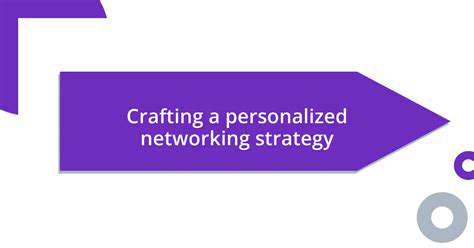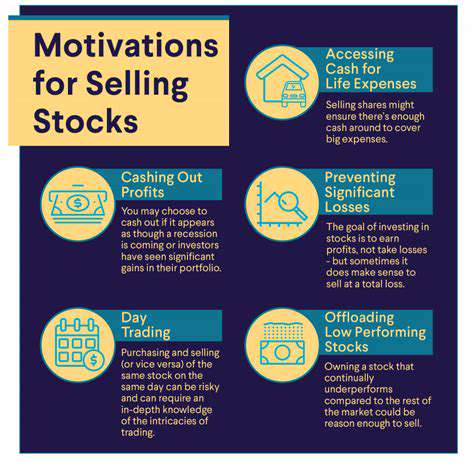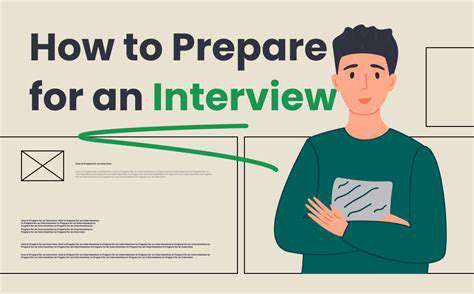Best Strategies for Networking as an Introvert
Identifying Your Introverted Strengths
Understanding Your Introverted Nature
Introversion isn't a weakness; it's a different way of experiencing the world. Introverts often recharge by spending time alone, reflecting, and processing information internally. This capacity for deep thought and introspection can translate into powerful strengths in networking. Instead of being driven by immediate social interaction, introverts often approach networking with thoughtful consideration, allowing them to build genuine connections rather than superficial ones. This deep consideration often leads to more meaningful, long-term relationships.
Recognizing your introverted tendencies is the first step to leveraging them effectively. Introverts often excel in roles that require meticulous planning, thoughtful analysis, and focused attention to detail. These qualities can be invaluable assets when it comes to research, preparation, and follow-up in a networking environment. By understanding your natural inclination to process information internally, you can channel your energy into strategic networking activities rather than feeling overwhelmed by large gatherings.
Leveraging Introverted Strengths in Networking
One key strength for introverts in networking is their ability to listen actively and deeply. This allows them to truly grasp the needs and concerns of others, fostering genuine connections that go beyond surface-level interactions. Introverts are often superb at providing thoughtful advice and support, demonstrating a willingness to invest time and energy in building lasting relationships. This approach often builds trust and respect, which are crucial elements in any successful networking strategy.
Introverts often shine when it comes to follow-up. Instead of feeling pressured to engage in constant conversation, they can use their quiet time to thoughtfully craft personalized messages, prepare insightful questions to ask, and stay connected with contacts after initial interactions. This dedication to follow-up demonstrates genuine interest and cultivates stronger relationships over time. These follow-up actions often go unnoticed by extroverted networkers, creating a valuable differentiator.
Strategic Networking Tactics for Introverts
Introverts can build strong networks by strategically choosing their networking activities. Attend smaller, more intimate events, workshops, or webinars, where meaningful interactions are more likely to occur. Avoid large, boisterous gatherings, and don't feel pressured to participate in every conversation. Instead, focus on quality interactions with key individuals. This allows introverts to connect with people on a deeper level, fostering stronger, more meaningful relationships.
Utilize online networking platforms and tools to engage in conversations and build relationships at your own pace. These platforms provide a more controlled environment where introverts can connect with others without the pressure of constant social interaction. Using online forums, groups, or social media can help to build connections and foster relationships in a comfortable and controlled way, allowing introverts to showcase their unique strengths in a way that suits their personality.
Crafting a Personalized Networking Approach

Understanding Your Network
A key aspect of effective networking is understanding your current network. This involves identifying the people you already know, analyzing their roles, and recognizing how they might be beneficial to your goals. Identifying mentors and potential collaborators within your existing network is crucial for leveraging your connections. Think about their areas of expertise and how they could support your career path. Consider the skills and experiences they possess that align with your professional aspirations.
Beyond the individuals you know, consider the broader network of people you aspire to connect with. Researching individuals and companies in your desired field can open doors to new connections. This initial research will help you understand the individuals and organizations in your field, and what types of connections will be valuable. This understanding will inform your approach to building connections.
Defining Your Goals
Before embarking on networking efforts, it's vital to define specific, achievable goals. What do you hope to gain from these connections? Are you seeking mentorship, job opportunities, collaboration on projects, or simply expanding your professional knowledge? Clearly articulating your goals will guide your networking approach and help you prioritize your efforts.
Identifying the types of connections you need and the specific outcomes you want will significantly increase your chances of success. This includes understanding the type of industry contacts you are looking to connect with and what you hope to gain from the interactions. Be sure to be precise about your goals to ensure you are meeting your objectives.
Developing a Strategic Approach
A strategic approach to networking involves planning your interactions and tailoring your approach to different individuals. This means understanding the context of your interactions and adapting your communication style accordingly. Consider the specific needs of each individual you interact with and tailor your conversation to be mutually beneficial. This thoughtful approach will help you build stronger, more meaningful relationships.
Researching the individuals you will be meeting with will help you to tailor your conversation and demonstrate that you have done your research and are serious about building a relationship. This approach will show respect for their time and demonstrate that you value their knowledge and experience.
Crafting a Compelling Narrative
Developing a concise and compelling narrative about yourself is essential for effective networking. This narrative should highlight your skills, experiences, and aspirations, but it should also be tailored to the specific context of each interaction. This allows you to connect with the people you meet on a deeper level. A well-crafted narrative will leave a lasting impression and increase the likelihood of follow-up interactions.
Practice your elevator pitch. This concise summary of your skills and goals will help you connect with others quickly and effectively. Practicing your pitch will make you feel more confident and prepared to network effectively. It is an important tool to have to effectively communicate your skills and goals and make a lasting impression.
Leveraging Online Platforms
Online platforms offer valuable opportunities for networking. Utilizing LinkedIn, industry forums, and other relevant platforms can help you connect with potential mentors, collaborators, and employers. Building a professional online presence is essential for showcasing your skills and experience to a wider audience. Actively engaging with others online can help you establish connections and build relationships that can lead to future opportunities.
Leveraging online platforms can help you find and connect with individuals who share your interests and can provide valuable insight into your field. Networking online allows you to stay current with industry trends and connect with individuals who can help you achieve your professional goals. This can provide you with information and insight that can be difficult to find otherwise.
Mastering the Art of Focused Conversation
Understanding the Power of Active Listening
Active listening is more than just hearing what someone says; it's about truly engaging with their message. It involves focusing on the speaker, paying close attention to their words, tone, and body language, and reflecting back what you've understood. This demonstrates respect for the other person and fosters a deeper connection, crucial for building rapport and trust in any networking situation. By actively listening, you show genuine interest, allowing the conversation to flow naturally and potentially uncovering valuable insights and opportunities.
Crafting Engaging Questions
Asking insightful questions is key to moving a conversation beyond surface-level pleasantries. Instead of generic inquiries, formulate questions that demonstrate your genuine interest in the other person's work, experiences, and perspectives. Probe for more information, ask about challenges they've overcome, and their aspirations. Tailor your questions to the specific individual and the context of the conversation, showing you're truly invested in understanding them.
Avoid yes/no questions and instead ask open-ended inquiries that encourage detailed responses. This will not only keep the conversation flowing but also reveal valuable information about their skills, expertise, and interests.
Identifying Common Ground
Discovering shared interests or experiences is a powerful way to build rapport and create a sense of connection. Pay attention to what the other person says, look for common threads in their background or professional interests. This doesn't mean forcing a connection; it's about acknowledging shared values or experiences in a natural way. Finding common ground helps create a more comfortable and engaging atmosphere, making the conversation more productive and potentially leading to future collaborations or opportunities.
Managing the Flow of Conversation
Maintaining a balanced exchange is essential for a productive networking conversation. Avoid dominating the conversation or letting it stagnate. Encourage the other person to share their thoughts and experiences, and be mindful of offering your insights in a way that feels natural and respectful. A good conversationalist knows when to listen, when to speak, and when to steer the conversation in a new direction to keep it fresh and engaging.
Leveraging Visual Cues and Body Language
Nonverbal communication plays a significant role in any interaction, particularly in networking. Maintaining eye contact, using open and inviting body language, and offering a warm smile can create a positive and approachable impression. Pay attention to your own body language and ensure it aligns with the message you're trying to convey. Observe the other person's body language as well, as it can provide valuable insights into their level of engagement and interest.
Anticipating and Addressing Potential Challenges
Networking conversations can sometimes encounter unexpected challenges, such as awkward silences or disagreements. It's important to be prepared for these situations. Practice active listening skills, and be ready to adapt your approach based on the other person's responses. Remaining composed and professional, even in challenging situations, is key. A crucial component of navigating such situations includes empathy and understanding, allowing for both sides of the conversation to be heard and respected.
Following Up and Building Relationships
A successful networking conversation doesn't end with the initial interaction. Follow up with a brief email or message summarizing key takeaways and expressing your continued interest in connecting. This demonstrates your commitment to building a relationship and allows for the opportunity to further develop connections and potentially explore future collaborations or opportunities. Remember that networking is an ongoing process, not a one-time event; nurturing the relationships you build is crucial for long-term success.
Leveraging Technology for Introverted Networking

Understanding Introversion
Introversion is a personality trait characterized by a preference for solitary activities and a need for periods of solitude to recharge. It's not about shyness or social anxiety, but rather a difference in how individuals experience and interact with the world. Understanding this fundamental aspect of introversion is crucial for effectively leveraging technology.
Introverts often find large social gatherings draining and prefer smaller, more intimate settings. This preference for quiet reflection and thoughtful engagement can be a significant asset in various aspects of life, and technology can play a crucial role in supporting and enhancing these introverted strengths.
Technology for Focused Work
Technology offers a plethora of tools designed to enhance focus and productivity. For introverted individuals, these tools can be invaluable in managing distractions and maximizing their time. Dedicated workspaces, digital noise-canceling apps, and time-management software can significantly contribute to improved concentration and efficiency.
Many introverts find the constant barrage of notifications from social media and other platforms overwhelming. By strategically using features like Do Not Disturb or app-specific focus modes, introverts can create a conducive environment for deep work and creative pursuits.
Personalized Learning Platforms
Online learning platforms provide flexible and personalized learning experiences. Introverts often thrive in environments that allow for self-paced learning and independent exploration. These platforms offer a structured, yet adaptable learning experience that caters to introverted learning styles.
Interactive simulations, online tutorials, and downloadable resources allow introverts to learn at their own pace and in a comfortable setting. This structured approach allows introverts to process information at their own speed, leading to greater comprehension and retention.
Streamlined Communication
Technology offers efficient and effective communication tools that can be especially beneficial for introverts. Platforms that allow for asynchronous communication, such as email or messaging apps, can reduce the pressure of immediate responses and allow introverts to formulate thoughtful replies. This flexibility can significantly reduce feelings of anxiety or overwhelm often associated with social interactions.
Remote Collaboration Tools
Remote work tools and collaborative platforms have become increasingly important in today's digital landscape. These tools enable introverted individuals to participate in projects and contribute effectively without the pressures of face-to-face interactions. Introverts often find these avenues more conducive to focused contributions.
Using video conferencing sparingly, or focusing on written communication, can make collaboration more manageable and less draining for introverts. This allows them to contribute meaningfully without feeling overwhelmed.
Building Strong Online Connections
Technology allows introverted individuals to build and maintain meaningful relationships in a less demanding environment. Online communities and forums focused on shared interests can provide opportunities for connection and support. Introverts can explore these online spaces to build meaningful relationships at their own pace.
Mindful Technology Use
It is crucial to use technology mindfully and intentionally. Introverted individuals should be aware of the potential for technology to be draining or overwhelming. Establishing boundaries, like designating specific times for checking social media, can support a healthy relationship with technology. Being intentional with technology use can help introverts manage their energy levels and avoid burnout.
Balancing online interactions with offline activities is essential. Introverts can benefit from scheduling time for solitary activities and engaging in hobbies that foster reflection and personal growth. This balance is essential to harnessing the benefits of technology while preserving the unique needs of introverted individuals.

![How to Learn a New Language Fast [Proven Methods]](/static/images/31/2025-05/FocusonCommunication3APracticeMakesPerfect.jpg)









